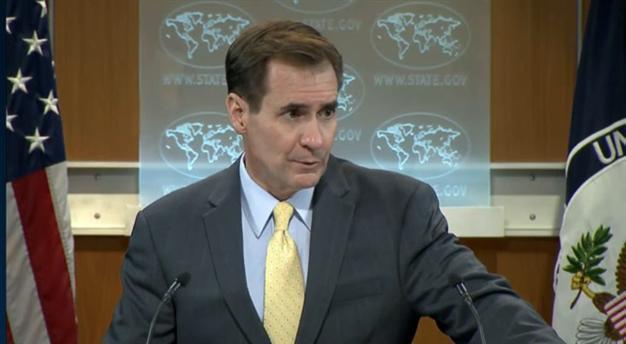US says cannot ‘confirm or deny’ YPG responsibility in Ankara blast
ISTANBUL

Still image from U.S. State Department spokesperson John Kirby's press briefing session on Feb. 18, 2016.
U.S. State Department spokesperson John Kirby has said Washington cannot “confirm or deny” whether the Syrian Kurdish People’s Protection Units (YPG) were responsible for the Feb. 17 attack on Ankara that claimed 28 lives.
“We’re in no position to confirm or deny the assertions made by the Turkish government with respect to responsibility,” Kirby told reporters during a daily press briefing session on Feb. 18, while adding that there was no question into the nature of the attack.
“[It was] clearly a terrorist attack, clearly taking innocent lives,” he said.
Kirby said the U.S. administration recognized Turkey’s right to protect its people in the face of terrorist attacks “like every nation around the world.” However, in response to a question asking whether it would be “warranted or acceptable” for Turkey to respond to the attack by hitting the YPG in Syria, Kirby said this was an “open question.”
“Nothing’s changed about our view that we’d like to see those tensions [between Turkey and the YPG] continue to de-escalate,” Kirby told reporters, underlining he would not speculate about “hypothetical responses by the Turks.”
The spokesperson also stressed that the U.S. kept communicating with the YPG to “not do things that are counterproductive” to the effort against the Islamic State of Iraq and the Levant (ISIL) while urging Turkey not to engage in cross-border shelling.
Kirby was also asked about Turkish President Recep Tayyip Erdoğan’s Feb. 14 statements questioning whether Turkey or Syria’s Democratic Union Party (PYD) was the U.S.’s ally, effectively asking the United States to make a choice between the two.
Admitting the strength of Erdoğan’s statement, Kirby refused to perceive the matter as one of choosing sides between Turkey and the YPG, which he defined as “effective, brave Kurdish fighters” in Syria.
“The side that we all need to be on here is the counter-Daesh side,” he said, using an Arabic acronym for ISIL.
Kirby’s statement was reiterated by the White House on Feb. 18, when deputy national security adviser Ben Rhodes said the U.S. was yet to identify who was behind the attack in Ankara.
“We, as a government, have not settled upon assignment of responsibility,” said Rhodes, who strongly condemned the incident.
“We’ve made clear to the Turks that in all of our engagements with the YPG and other Kurdish elements that we make very clear to them the importance of our alliance with Turkey and the importance of them not engaging in efforts that would undermine what should be our focus, which is the shared threat of ISIL,” he added.
Turkey informed ambassadors of five permanent members of the United Nations Security Council, as well as the envoys of Germany, the Netherlands (the EU’s current term president) and the EU delegation in Ankara, on Feb. 18 that the deadly attack in Ankara was perpetrated by the YPG.
Earlier in the day, both President Recep Tayyip Erdoğan and Prime Minister Ahmet Davutoğlu announced the attack was conducted by a Syrian national and alleged he was a member of the YPG, the armed wing of the PYD. Turkey recognizes the PYD as an offshoot of the outlawed Kurdistan Workers’ Party (PKK) and therefore has called on allies not to lend support to the group though the group is currently fighting ISIL with Western support.
Davutoğlu told reporters that he instructed the Foreign Ministry to provide all necessary information about the Ankara incident, including evidence that supposedly proved the YPG was behind the bombing.
